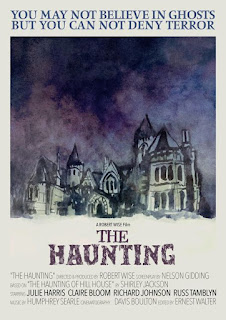This Halloween special on Sky arts is a repeat from 2019. Ian Nathan is joined by regulars Neil Norman, Stephen Armstrong and Bonnie Greer show clips and talk about their favourite horror movies.
Number 20: The Mummy from 1932 and directed by Karl Freund. The black and white restoration looks wonderful. Boris Karloff is genuinely scary.
Number 18: The Haunting from 1963 in black and white and produced and directed by Robert Wise.. Stephen Armstrong says "it's what you imagine, not what you saw" Ian Nathan adds "it's one of the greatest supernatural stories ever told".
Number 17: The Ring directed by Hideo Nakata. Far too scary to watch these days. Neil Norman called this Japanese horror "one of the scariest films ever made". I have to agree.
Number 16: The Wicker Man directed by Robin Hardy from a script by Anthony Shaffer. A classic British horror movie that we were told has an underlying threat all the way through.
Number 15: Scream from 1996. It's Wes Craven who is to blame. He restarted mainstream horror with an all star cast. I find that, in the main, slasher movies are too manipulative these days. There are what, five sequels?
Number 14: From Dusk Till Dawn from 1996. Directed by Robert Rodriguez from a script by Quentin Tarantino. Somehow the film made violence funny. It is so over the top and the special effects are amazing but shocking. Stephen Armstrong is struck how a standard thriller turns on it's head with the introduction of Salma Hayek as Santanico Pandemonium.
Number: Repulsion from 1965. Directed by Roman Polanski this is a film made up of pretty horrible effects. Are what we are seeing visions or nightmares for a disturbed young woman. Or is she still a girl? In any case she sees men as a threat.
Number 12: Freaks from 1932. A Todd Browning film that Neil Norman says is hard to watch these days and everyone agrees. Far too exploitative. But it had to be included.
Number 11: Invasion of the Body Snatchers from 1956 and directed by Don Siegal. Ian Nathan says this film "defined an era". I preferred Bonnie Greer's take that this was a satire. Were the organisms Alien or man made?
Number 10: Halloween in 1978. Director John Carpenter started off all the slasher movies to come. I now think that jump scares are just too cheap. The one thing I didn't realise in this film was that there were so many shots from the killers' point of view. I blame Jamie Lee Curtis.
Number 8: Night of the Living Dead from 1968. A George Romero film, actually his first. A tiny budget made in his own backyard! It seemed so radical at the time, the invention of the zombie genre. The presenters wanted us to know that having a black actor (Duane Jones) in the leading role was "a radical choice".
Number 7: Rosemary's Baby from 1968. This was an adaptation of a hugely popular book of the time. Roman Polanski cast Mia Farrow in the leading role. I watched it at the cinema, waiting for that unconventional ending.
Number 6: Nosferatu from 1922. The oldest film on the list, a silent movie of German expressionism whatever that may be. There were legal battles as it heavily relied on the Dracula story. But Stephen Armstrong said it was "a completely different film".
Number 5: The Omen from 1976. A fine, subtlety directed Richard Donner movie with Lee Remick and Gregory Peck. The starry cast helps make it work. Ian Nathan said it was an "orchestrated melodrama" and Bonnie Greer said it shocked America. Someone said it was the least ironic movie ever made.
Number 4: The Exorcist from 1973. Was this William Friedkin film a predecessor for the previous movie? Stephen Armstrong tells us that this was a possession drama that was "unique at the time". Neil Norman said "the special effects are astonishing". Of course we were shown the point when Max von Sydow arrives at night and takes the film to another level. Ian Nathan calls it "very claustrophobic" and Bonnie Greer said she was in the queue to see it and could not believe all those sounds.
Number 3: The Shining from 1981. The hugely familiar Stanley Kubrick movie that "transcends Stephen King". Neil Norman said that this was "one of the classiest horror movies ever made". Bonnie Greer said "see it again" and I will. It's in my Stanley Kubrick DVD collection.
Number 1: Frankenstein from 1931. The James Whale directed film from the Mary Shelley book. Ian Nathan starts by saying the panel had to come up with their best horror movie and all agreed on this one. It was the ultimate classical horror film that even today looks so modern. Here is a man playing God, but it is Boris Karloff as the monster and victim who makes it a classic. There is so much pathos in how he is presented to us. The make up is fantastic even today. It changed the rules for horror pictures.


_poster.jpg)


_UK_poster.jpg)


.jpg)

.jpg)


_poster.jpg)




_U.K._release_poster_-_The_tide_of_terror_that_swept_America_IS_HERE.jpg)
_theatrical_poster_(retouched).jpg)

No comments:
Post a Comment